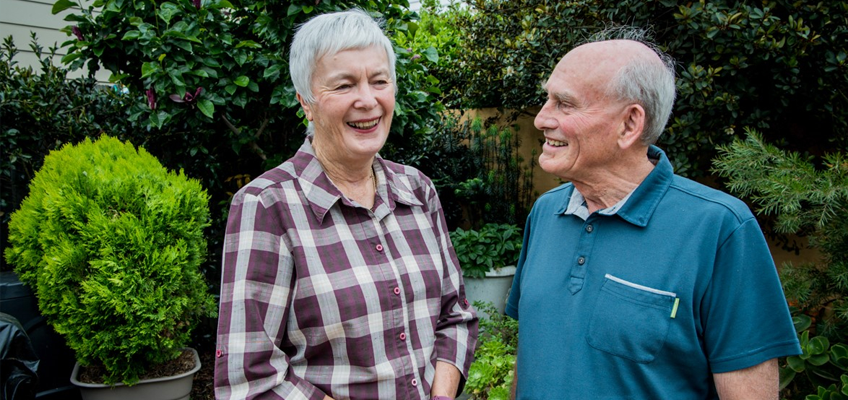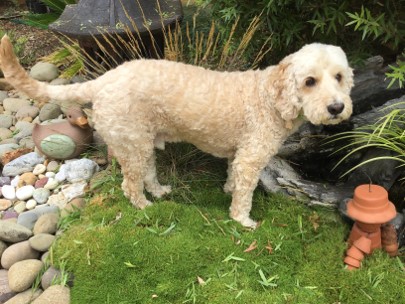09 Apr 2020

HEIDI DOUGLASS | h.douglass@unsw.edu.au
Photo credit Brendan Esposito, ABC
Along with 6,000 other Australians, 77-year-old Paddy Goldsmith is playing a vital role in changing the future of Alzheimer’s disease and other dementias through her participation in the Maintain Your Brain research trial.
Led by the Centre for Healthy Brain Ageing (CHeBA) at UNSW Sydney, Maintain Your Brain is the world’s largest internet-based trial aimed at preventing dementia.
My motivation to be involved in research came after losing two friends to dementia; one of whom was especially dear to me, says Paddy.
“We also know six other families who have a family member living with the disease and my simple hope is that our involvement will help others in the future. Witnessing our friends and their carers endure the downward path of dementia was undeniably a strong motivator to join a prevention trial.”
The Maintain Your Brain trial addresses risk factors for dementia, including physical inactivity, cognitive inactivity, obesity and poor dietary habits, with all activities and assessments completed on a computer via an eHealth system.
Paddy was born in England and moved to Australia in 1969 with husband Geoff. They live in the beautiful countryside of Bowral not far from their two Sydney-dwelling sons, two grandchildren, a grand-dog and grand-cat.

Through their career lives Geoff was a mechanical engineer and Paddy worked in the pharmacy industry. Their ‘work hard, save hard and play hard’ attitude has continued through their retirement which now spans some 20 years. During that time Geoff and Paddy have travelled to many countries and spent many months remote camping in Australia. Although Paddy has had a brain tumour removed and Geoff is now registered blind, she says they both count themselves extremely lucky to be able to enjoy everything that they do. She has been a research participant with Maintain Your Brain for nearly two years.
For Paddy, the personal benefits of being involved in a research trial are enormous.
I firmly believe this program has benefited both Geoff and I greatly and we would love future generations to follow the same path, starting at a much younger age!
Paddy says she now concentrates better through the brain training, feels much better in herself through the dietary changes she has made as a result of the program and feels she has recovered more quickly from brain surgery than would have been the case without the benefit of the required exercise.
Of the various requirements, Paddy has no preference and enjoys them all, although finding the time to undertake it all has presented challenges, especially as she has also commenced an Understanding Dementia course through the University of Tasmania.
“Having a husband who is registered blind means my time is limited for other interests and the program has eaten into my precious ‘me time’ which I treasure each morning.
“The brain training has, quite frankly, been a huge challenge on its own and I am mentally exhausted after each session."
However Paddy is now finding that, as a result of the brain training, she is now trying to set herself little challenges during the day such as trying to beat the cash register at the shops, not using a calculator and memorising the shopping list. She is also now growing as many vegetables as possible to fit in with their new dietary habits, rather than just a few and confesses she’ll never be perfect as she has a penchant for cake.
“The change in our diet has quickly become a way of life for us now and we wouldn’t even consider returning to our old ways.”
Paddy confesses that, on two occasions, she considered giving up on the brain exercises because she was finding them taxing. It was a conversation with a carer friend that brought her back into line.
“My friend expressed the distress and frustration they were experiencing as a carer to their partner which reminded me of the reality of dementia and of how lucky I was,” says Paddy.
I would be letting the Maintain Your Brain team down – as well as future generations - to give up, she says.
To her fellow research participants that have encountered similar challenges her message is simple – please don’t give up!
“There are many folk in the years ahead that will benefit from what we are contributing to now; possibly even someone from our own family,” says Paddy.
Her advice to stay motivated is to learn more about dementia and risk reduction.
“The more I learn about dementia and the associated risk factors, the more I hope the work of Maintain Your Brain will bring about a change that is recognised by more people.”
